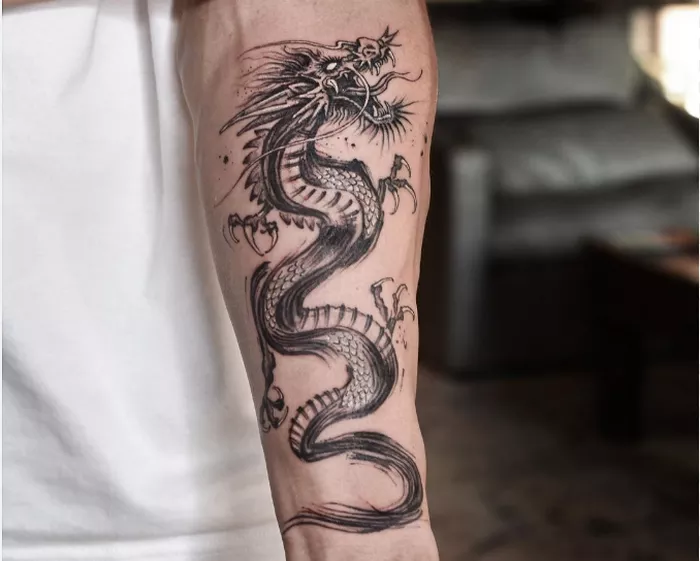Dragon tattoos are powerful symbols that can represent various personal and cultural meanings. With their rich history and diverse designs, choosing the right dragon tattoo requires careful consideration. But how do I decide what dragon tattoo to get? This comprehensive guide will help you navigate the decision-making process, ensuring you select a tattoo that aligns with your preferences, values, and lifestyle.
1. Understanding Dragon Tattoo Symbolism
Historical and Cultural Significance
Dragons hold significant meanings across different cultures. Understanding these can help you choose a design that resonates with your values.
Chinese Dragons: Symbolize strength, wisdom, and protection. They are often seen as benevolent creatures that bring good fortune.
Japanese Dragons: Represent water, rain, and agriculture. They are usually depicted as wise and powerful beings, associated with protection and growth.
Western Dragons: Often depicted as evil or chaotic, symbolizing destruction and greed. However, modern interpretations sometimes reframe them as symbols of power and transformation.
Personal Symbolism
Consider what the dragon symbolizes to you personally. It might represent:
Strength: A dragon can symbolize personal power and resilience.
Transformation: As a creature that often undergoes significant changes, a dragon can represent personal growth or transformation.
Protection: Some see dragons as guardians, providing a sense of safety and security.
2. Choosing the Right Style
Traditional Styles
Different styles offer various aesthetic and symbolic elements:
Realistic Dragons: Focus on lifelike details and accuracy. Ideal for those who appreciate fine artistry and a more natural depiction.
Traditional or Neo-Traditional Dragons: Incorporate bold lines and bright colors. These styles often have a classic, timeless look.
Japanese Irezumi: Features intricate patterns and often includes waves, clouds, or cherry blossoms. This style emphasizes flow and movement.
Modern Interpretations
Modern dragon tattoos might blend traditional elements with contemporary aesthetics:
Minimalist Dragons: Use simple lines and shapes. Suitable for those who prefer a subtle, understated design.
Geometric Dragons: Combine dragon imagery with geometric patterns. Offers a modern, abstract look.
Watercolor Dragons: Use vibrant colors and blending techniques to create a fluid, artistic design.
3. Design Considerations
Placement and Size
The location and size of your tattoo can significantly impact the overall design:
Back: Ideal for large, detailed designs. Allows for an expansive, dramatic portrayal of the dragon.
Arm or Sleeve: Offers a canvas for intricate details and continuous designs that wrap around the arm.
Leg or Thigh: Similar to the arm in terms of space, allowing for detailed designs that can be showcased or easily covered.
Chest: Provides a large area for symmetrical or expansive designs. Often used for full chest pieces or central designs.
Integration with Other Elements
Consider how your dragon tattoo might integrate with other tattoos or designs:
Complementary Themes: If you have other tattoos, think about how the dragon can complement or enhance existing designs.
Background Elements: Include elements like clouds, flames, or waves to enrich the dragon’s design and add context.
4. Personal Style and Preferences
Color Choices
The color scheme can affect the tattoo’s impact and meaning:
Traditional Colors: Reds, greens, and golds are common in traditional dragon tattoos.
Black and Grey: Offers a classic, timeless look and can emphasize shading and detail.
Custom Colors: Choose colors that reflect your personal preferences or hold specific meanings for you.
Artistic Preferences
Detailed vs. Simplistic: Decide whether you prefer a highly detailed dragon or a more simplistic, stylized version.
Dynamic vs. Static: Consider whether you want the dragon in a dynamic, action-oriented pose or a more static, symmetrical design.
5. Working with a Tattoo Artist
Researching Artists
Finding the right artist is crucial for achieving your desired result:
Portfolio Review: Examine the artist’s previous work to ensure their style aligns with your vision.
Specialization: Look for artists who specialize in dragon tattoos or the style you prefer.
Consultation and Design Process
Initial Consultation: Discuss your ideas, preferences, and any concerns with the artist. Provide reference images or sketches if you have specific ideas.
Design Drafts: Work with the artist to create a draft design. Be prepared to provide feedback and make adjustments as needed.
Final Approval: Ensure you are satisfied with the final design before proceeding with the tattoo.
6. Preparing for Your Tattoo
Pre-Tattoo Care
Health Considerations: Ensure you are in good health and free from skin conditions that might affect the tattoo.
Skin Preparation: Follow any pre-tattoo instructions provided by your artist, such as moisturizing or avoiding sun exposure.
Aftercare
Immediate Care: Follow aftercare instructions to ensure proper healing. This typically includes keeping the tattoo clean, moisturized, and protected from the sun.
Long-Term Care: Continue to care for your tattoo by moisturizing regularly and avoiding activities that might cause damage.
See also: What Are the 9 Chinese Dragons Tattoos?
Conclusion
Choosing a dragon tattoo involves a blend of understanding cultural meanings, selecting a style that resonates with you, and working closely with a skilled tattoo artist. By considering the symbolism, design elements, and personal preferences, you can ensure that your dragon tattoo reflects both your aesthetic desires and meaningful symbolism.
Whether you opt for a traditional design or a modern interpretation, a dragon tattoo is a powerful statement of personal strength, transformation, and protection. By taking the time to carefully consider each aspect of your tattoo, you’ll create a lasting piece of art that is both visually striking and deeply meaningful.

